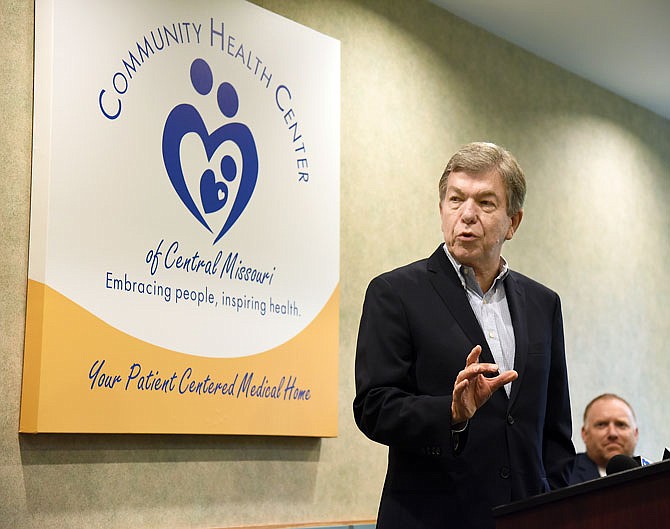Treat the whole person, no matter the issue, U.S. Sen. Roy Blunt told mental health and behavioral advocates on Wednesday in Jefferson City.
"Treating all health the same way creates an environment where we're have a much better chance to help people who need help and know where to go to get it," the Missouri Republican said. "When we can be as open about a mental health challenge as we can if my mom has cancer, my dad just had a heart stint put in or any other problem we're willing to talk about with each another, we would've gotten to a good place on this."
As a co-sponsor of the 2014 Excellence in Mental Health Act (EMHA), Blunt was impassioned by actions taken by places like the Community Health Center of Central Missouri, a federally qualified health center that accepts insured and uninsured patients for their ability to serve patients who may suffer from a form of mental illness.
"The model that we have here at federally qualified health centers, like ours here in Jeff, is the model everyone should be going to. People get treated regardless of the nature of their issue in the same setting," said Richard Lillard, director of behavioral health services at CHCCM. "From the behavioral health standpoint, it helps minimize the stigma that has historically been attached to going to see a psychiatrist or a counselor."
Lillard said people are more apt to talk to their primary care provider about any mental or behavioral issues. So once a person expresses concern to their primary care doctor, it would be best if a behavioral health person can be brought in to the exam room to help promote treatment of the whole person, he said.
Currently, CHCCM offers services in behavioral health, family medicine, dental, pediatrics, pain and chronic disease management, and women's health.
Locally, Compass Health and the Community Health Center are two of 200 providers across the state where patients can get treated. CHCCM also has facilities in California, Fulton and Linn.
With the support of federal funds, Compass Health behavioral clinics now offer walk-in services, promoting immediate access for care four days a week, according to Tim Swinford, president at Compass Health.
Under the EMHA, Missouri is one of eight states selected to receive funding through a two-year pilot program from the Substance Abuse and Mental Health Services Administration. As of December 2016, the other seven states selected were: New York, New Jersey, Oregon, Oklahoma, Pennsylvania, Minnesota and Nevada.
Under the Affordable Care Act, Blunt said, there was a clause that would grant $1.6 billion to the states for two years, but Blunt recently filed the Community Health Investment, Modernization and Excellence Act that would extend funding for another five years.
Blunt told those at the news conference delays in the budget process would not hinder the funds from flowing to the centers at this point.
Without extension of the Community Health Center Fund, community health centers would lose 70 percent of their funding. This would result in an estimated 2,800 site closures, the loss of 50,000 jobs, and 9 million Americans losing their access to care, according to a late September press release on the senator's website.
The release also notes more than half of a million Missourians, 27 percent of whom are uninsured, rely on community health centers to provide critical, affordable health care services.
"We're like 50 years behind frankly in the way we treat mental health," Blunt said. "The local law enforcement and the emergency rooms in the country have become the de facto mental health delivery system for the country and its totally unacceptable. Nobody benefits from it.
"Now, if you have a health problem, including a behavioral health problem, there are 200 places across Missouri you can go to get treated just like any health problem," he said.

